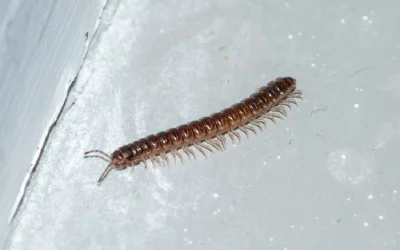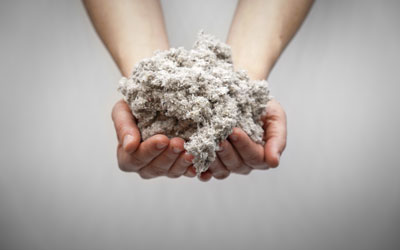Here at Russell’s Pest Control, one of the most common calls of concern we receive is something along the lines of, “I’m seeing a lot of centipedes in my basement. Should I be concerned?” This is certainly the time of year to see centipedes in your basement. These creatures have two things going against them when winter comes: They can’t control their body temperature, and they have a hard time regulating their body moisture. For this reason, they will sometimes enter man-made structures to protect themselves and wait out the winter.
Centipedes also lay their eggs in late spring and early summer, which means they will be adults when they come to overwinter in your home. This makes them hard to miss, but the real question is whether these legged insects are dangerous or not. The experts at Russell’s Pest Control are here to lay down the facts.
Dangers of Centipedes
- If one centipede in your home is one centipede too many, you should be concerned. These creatures are just about as disgusting to look at as any critter you’ll find invading your home. For some people, the sight of them can instill an immediate sense of panic. If this is you, you should probably be concerned.
- Centipedes can bite. It is quite rare, but they can do it. These pests are no more toxic to most humans than a house spider. There are some people, however, who experience severe pain when bitten. If you know yourself to be one of those people, you should be concerned.
- If centipedes are getting into your home, you may have some rot issues and water problems that need to be addressed. These creatures like moisture and will often find a way into a home through areas where moisture has caused the wood to rot.
Are Centipedes Beneficial Insects?
House centipedes are known to kill arachnids. If you don’t like spiders, a basement full of centipedes may be a good thing. These creatures can crawl up through wall voids and reduce the spider population in your walls. But it is important to point out that this reduction is slight, and nowhere near as effective as direct pest control measures. So, if you don’t have a pest plan and you’d like fewer arachnids around, you may not need to be concerned. Overall, if bugs don’t bother you, you have nothing to worry about. These pests can crawl over your house with little or no effect on your health or well-being.
Need to Get Rid of Centipedes?
Are you concerned about a basement full of centipedes? The pest experts here at Russell’s Pest Control can give you a hand with that problem and help you assess entry points that are allowing these pests to get in. Effective pest control isn’t just a quality of life upgrade, it is essential to protecting your home’s equity and your family’s health. Contact us today to get expert advice or to schedule an inspection!

